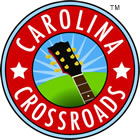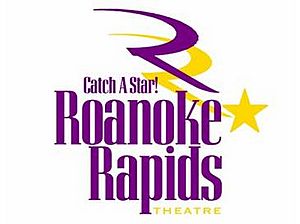Carolina Crossroads facts for kids
Carolina Crossroads is a large entertainment area in Roanoke Rapids, North Carolina. It covers about 1,000 acres (4 square kilometers) and is located near major highways, I-95 and US 158. This makes it easy for people traveling between places like New York and Florida to visit.
The idea for Carolina Crossroads started in the early 2000s. The goal was to create a fun place with lots of shows and attractions. By 2008, some parts were ready, including an indoor theater, an outdoor amphitheater, an RV park, and a hotel. The indoor theater, which was meant to be the main attraction, faced many challenges. Today, it is open and known as the Weldon Mills Theater.
Contents
What Was Planned for Carolina Crossroads?
The people who planned Carolina Crossroads hoped it would bring many new jobs to the area. Before this, many textile factories had closed, and jobs were lost. The idea was to change the local economy from making things to attracting tourists. They looked at places like Branson, Missouri, which is famous for its live shows, as an example.
The location was chosen because it's about halfway between New York and Florida. It's also close to big cities like Raleigh, North Carolina, Richmond, Virginia, and the Hampton Roads, Virginia area.
Fun Attractions and Entertainment
The complex was designed to have many exciting features:
- A large indoor theater with over 1,500 seats for live shows.
- A huge 90-acre outdoor amphitheater for concerts and events.
- A special track for tractor pulling competitions.
There were also big plans to add even more attractions to the 1,000-acre entertainment zone. These included an aquarium, a water park, shops, restaurants, a golf course, and more hotels.
The Zippin Pippin Rollercoaster
An exciting plan was to build a rock-and-roll-themed amusement park. Carolina Crossroads even bought a famous old wooden rollercoaster called the Zippin Pippin. This rollercoaster was one of the oldest in the world! It used to be at a park called Libertyland in Memphis, Tennessee. However, the amusement park plans didn't happen. Carolina Crossroads later gave most of the rollercoaster back to Libertyland. They kept one car from it, hoping to build a copy of the famous ride someday.
The Theater's Beginning
The city of Roanoke Rapids borrowed $21.5 million to build the indoor theater. In 2005, they made a deal with Randy Parton, who is the brother of famous country music star Dolly Parton. Randy Parton was hired to perform and manage the theater. He was paid a large salary and was also given a home and a car.
The theater opened on November 11, 2005, and was named the Randy Parton Theater. However, it was hard to get enough people to come to the shows. The theater needed about 1,500 paying customers per show to make money, but often only a few hundred people attended.
Challenges and Changes
There were concerns about how the theater's money was being managed. By late 2007, the city's mayor talked to Randy Parton about these issues. Soon after, the city decided to take over the theater's management.
In November 2007, the city hired a company called UGL Unicco to run the theater. This company helped book many new shows for 2008. For the first time, the theater actually made a small profit of $17,000 under their management, after losing a lot of money before.
On January 8, 2008, the city ended its contract with Randy Parton. The theater was then renamed the Roanoke Rapids Theater. Even with new management, selling tickets remained a challenge.
New Managers and Owners
The theater continued to face difficulties. In February 2008, UGL Unicco stopped managing the theater because the city had trouble making payments. The city then managed the theater itself until it closed in the summer of 2008.
Over the next few years, the theater was sold or leased to different owners several times. Each new owner tried to make it successful, sometimes renaming it. For example, it was called the Roanoke Rapids Theatre again, then the Royal Palace Theatre. However, these attempts often ended because of financial problems or other issues.
The Amphitheater's Journey
Separately from the indoor theater, the outdoor amphitheater also had its own story. It operated for a short time as the Atlantic One Amphitheater. After that, it was bought by a new owner, Carolina Dirt, and renamed The Festival Park at Carolina Crossroads.
The Theater Today
After many changes, the city of Roanoke Rapids sold the theater in July 2018. It continued to open sometimes, but the amphitheater remained closed. In 2019, the state government even considered helping the city with the debt from the theater project.
In 2023, Bruce Tyler, who owns a local distillery, bought the theater. He reopened it as the Weldon Mills Theater. It has already hosted shows and has more planned for the future.
Future Plans for the Area
The Carolina Crossroads area continues to look for new ways to grow. In 2023, Roanoke Rapids changed its rules to allow for a casino to be built there. However, a state law to allow casino gambling did not pass that year.
In 2024, the city approved plans for a multi-use facility that could host horse racing. Also, in 2025, work began to reopen the amphitheater, which had become overgrown. The goal is to host concerts there starting in August 2025.
See also
- List of contemporary amphitheatres



